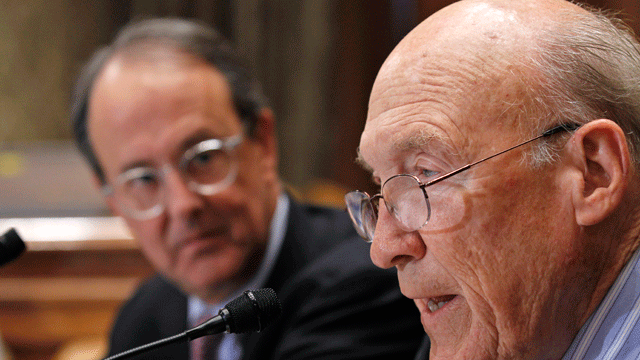
Erskine Bowles, left, accompanied by former Wyoming Sen. Alan Simpson, co-chairmen of President Barack Obama's bipartisan deficit commission, take part in a news conference on Capitol Hill in Washington Wednesday, Nov. 10, 2010. (AP)
A proposal to eliminate or scale back the current tax deduction that homeowners receive for the interest they pay on their mortgages is being widely criticized by people across the ideological spectrum.
Economists of all stripes and a mortgage banking group say the proposal, which is part of a preliminary plan that bipartisan leaders of President Obama's deficit commission released Wednesday, is either ill-timed or ill-advised.
"Given the fragile state of the nation's housing market, now is not the time to be scaling back incentives for homeownership," said Michael D. Berman, chairman of the Mortgage Bankers Association. "The mortgage interest deduction is one of the pillars or our national housing policy, and limiting its use will have negative repercussions for consumers and home values up and down the housing chain."
The full 18-member White House commission hasn't made recommendations yet but the chairmen have admitted their plan is dead on arrival.
Sen. Kent Conrad, D-N.D., chairman of the Senate Budget Committee and one of the deficit panel's members, told Fox News on Wednesday that he supports the bottom line of the plan put forward the panel's co-chairmen, Democrat Erskine Bowles and Republican Alan Simpson,
"It does get a hold of our debt crisis," Conrad said, noting that it projects cutting $4 trillion of the nation's $14 trillion debt over the next 10 years. Conrad said if America doesn't confront its debt crisis, the country is headed toward becoming a "second-tier economic power."
As for the mortgage deduction proposal, an aide to Conrad told FoxNews.com that he is studying it.
"He has long maintained that tax expenditures need to be reined in, but I don't think he ever envisioned mortgage interest would be eliminated totally," the aide said.
The deficit-reduction proposal by Bowles and Simpson offers some options for comprehensive tax reform.
Under the so-called "Zero Plan" option, the government would eliminate most tax loopholes and deductions to raise an estimated additional $1.1 trillion in taxes, while simplifying the tax code by setting just three rates, the lowest at 8 percent, the middle at 14 percent and the top one at 23 percent.
A second option would limit the mortgage deduction -- excluding second residences, home equity loans and mortgages over $500,000.
But supporters of the mortgage interest deduction note that for millions of homeowners it is the biggest tax break they can claim, and it can reduce the amount of taxes they have to pay by thousands of dollars.
Critics, though say the deduction is unfair and expensive.
"When you think about who benefits, it's regressive," said Isabel Sawhill, a senior fellow in economic studies at Brookings Institution. "The people who get the biggest benefits are in the top tax bracket and own the most expensive homes. "
The deduction is projected to cost the Treasury Department $104 billion in 2010, up from $86 billion in 2009, according to the Joint Committee on Taxation. The deduction is estimated to cost $135 billion in 2013.
About 25 percent of tax filers received the deduction in 2008, according to the committee, most of whom made $100,000 or more.
Since 1913, homeowners have been allowed to deduct the interest paid on mortgages for their primary residences, second homes and most home equity lines of credit. The deduction was capped in 1986 to loans totaling $1.1 million or less.
Sawhill questioned whether Americans want to give "subsidies to people buying houses costing $700,000."
"There's no reason why we should be, in my view, favoring this type of investment over others," she said.
But Sawhill added now is not the time to end the deduction.
"I think any economist would tell you it would be a mistake to scale it back it in any rapid way, especially in today's housing market," she said. "It would need to be phased in gradually and once the housing market is in better shape."
Alan Viard, an economist at the American Economic Institute, agreed, saying it's a "tricky time to be addressing the deduction but of course it needs to be done."
"Our current tax system steers a lot of capital into owner-occupied housing and away from the business sector," he said. "Reducing preferential treatment has been on the wish list of economists at how to improve the tax code."
Drew Tignanelli, president of The Financial Consulate and host of the Baltimore radio show "Money, Riches and Wealth," called the idea "the most ridiculous thing you could do at this time" with "the housing market on life support."
"I could see it back in 2004 or 2002 when the market was on a rampage. Maybe it was brilliant idea," he said, adding that now, "it's probably the dumbest idea anyone has come up with."
Tignanelli advocates eliminating the income tax and focusing on taxing consumption.
"You should not discourage people from being productive and using it in the most productive ways possible," he said.
J.D. Foster, a senior fellow in economics at the Heritage Foundation and a former economist in the Bush administration, said a mortgage deduction is appropriate in the context of an income tax because it's "essential for neutrality."
But he objected to the larger plan released that he said is an "overarching ruse for a massive tax hike" because it aims to raise revenues up to a record high of 21 percent of GDP.
"They're trying to get us wrapped up around other issues," he said. The main point is it's a big tax hike."




